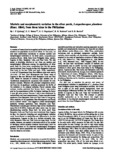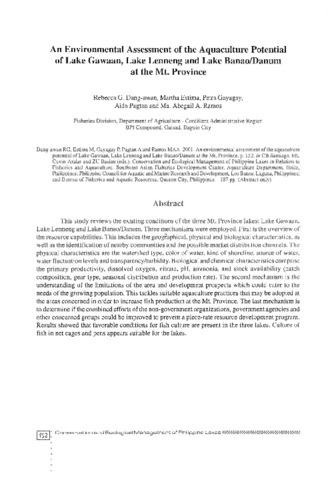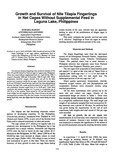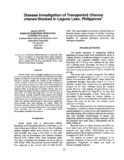Meristic and morphometric variation in the silver perch, Leiopotherapon plumbeus (Kner, 1864), from three lakes in the Philippines

រកមើល / បើក
Request this document
កាលបរិច្ឆេទ
2007Page views
323ទិន្នន័យមេតា
មើលកំណត់ត្រាលម្អិតនៃធាតុCited times in Scopus
Share
អរូបី
A number of researchers have applied multivariate methods to elucidate the population structure of fishes. In this study, we also used multivariate techniques to examine meristic and morphological variations in the silver perch, Leiopotherapon plumbeus (Kner, 1864), from three Philippine lakes, namely, Laguna de Bay, Sampaloc Lake, and Taal Lake. We also aimed to determine whether or not there are meristic and morphological differences among the populations of silver perch from the three lakes, considering that this fish species was introduced from Laguna de Bay into Sampaloc Lake and Taal Lake in the late 1950s and early 1970s, respectively. A total of 710 specimens from four different sites were used in the study: 155 each from Binangonan and Tanay areas of Laguna de Bay and 200 each from Sampaloc Lake and Taal Lake. Based on analysis of variance, eight meristic and 26 transformed morphometric characters were selected for subsequent analyses. Nineteen (19) principal components extracted from the 34 significant variables accounted for 82.3% of the variation in the original variables. Factor analysis using varimax rotation produced four factors: factor 1 was dominated by fin measurements while the highest loadings for factor 2 were gill raker counts. Factors 3 and 4 were dominated by various body and head measurements. Cluster analysis showed specimens from Sampaloc Lake and Taal Lake in one group, while majority of the specimens from Binangonan and Tanay are in another cluster. This suggests a closer morphological similarity between specimens from Sampaloc and Taal. Discriminant analysis gave relatively high correct classification rates (76.13–95.50%). Lower gill raker count was the most discriminating variable. Since both the silver perch from Sampaloc Lake and Taal Lake were introduced from Laguna de Bay, the observed clustering and morphological variation could be attributed to similarities and differences in the lake environments. Laguna de Bay is a shallow eutrophic lake, while Sampaloc Lake and Taal Lake are deep lakes. Further studies, however, are needed to determine which of the myriad of biological and/or physico–chemical factors might have the greatest influence on the observed morphological divergence between the source population and transplanted populations that we found in our study.
Suggested Citation
Quilang, J. P., Basiao, Z. U., Pagulayan, R. C., Roderos, R. R., & Barrios, E. B. (2007). Meristic and morphometric variation in the silver perch, Leiopotherapon plumbeus (Kner, 1864), from three lakes in the Philippines. Journal of Applied Ichthyology , 23(5), 561-567. https://doi.org/10.1111/j.1439-0426.2007.00862.x
ប្រធានបទ
Taxonomic term
បណ្តុំបណ្តុំ
- AQD Journal Articles [1243]
Related items
Showing items related by title, author, creator and subject.
-
An environmental assessment of the aquaculture potential of Lake Gawaan, Lake Lenneng and Lake Banao/Danum at the Mt. Province
Dang-awan, Rebecca G.; Estima, Martha; Gayagay, Petra; Pagtan, Aida; Ramos, Ma. Abegail A. (Aquaculture Department, Southeast Asian Fisheries Development Center; Philippine Council for Aquatic and Marine Research and Development (PCAMRD), Department of Science and Technology; Bureau of Fisheries and Aquatic Resources, 2001)This study reviews the existing conditions of the three Mt. Province lakes: Lake Gawaan, Lake Lenneng and Lake Banao/Danum. Three mechanisms were employed. First is the overview of the resource capabilities. This includes ... -
Growth and survival of Nile tilapia fingerlings in net cages without supplemental feed in Laguna Lake, Philippines
Basiao, Zubaida; San Antonio, Antonio (Asian Fisheries Society, 1986)Oreochromis niloticus fingerlings were stocked at densities of 50, 100, 150 and 200 fish/m super(2) in fixed net cages in Laguna Lake, Philippines. These were reared without supplemental feed on 1 April-30 July 1980, 5 ... -
Disease investigation of transported Chanos chanos stocked in Laguna Lake, Philippines
Lio-Po, Gilda; Duremdez-Fernandez, Roselyn; Villaluz, A. (Asian Fisheries Society, 1986)Milkfish,Chanos chanos fingerlings transported by boat (petuya) for seven to eight hours were observed for stress-inducing factors during transport, daily for 10 days after stocking in pens in Laguna Lake, Philippines. ...






